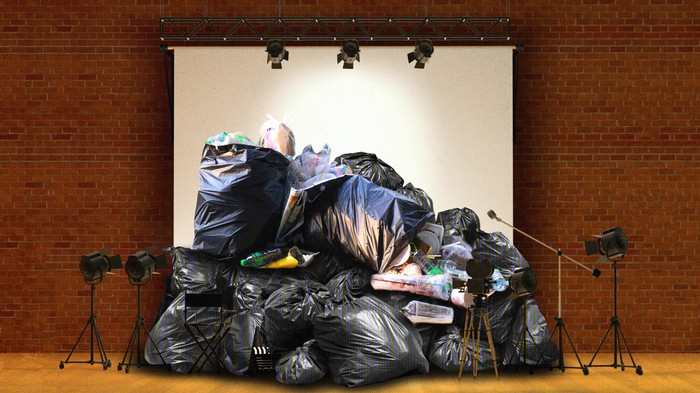Community, Leadership, Experimentation, Diversity, & Education
Pittsburgh Arts, Regional Theatre, New Work, Producing, Copyright, Labor Unions,
New Products, Coping Skills, J-O-Bs...
Theatre industry news, University & School of Drama Announcements, plus occasional course support for
Carnegie Mellon School of Drama Faculty, Staff, Students, and Alumni.
CMU School of Drama
Monday, October 21, 2019
Behind Every Film Production Is a Mess of Environmental Wreckage
VICE: Jurassic World: Fallen Kingdom didn't make much of an impression with critics, but the $300 million blockbuster represented an immense undertaking. Preproduction started in 2015 and included the film’s writer taking a cross-country road trip to hash out story details and a four-week working trip in Barcelona, where director J.A. Bayona and production designer Andy Nicholson figured out visuals like set design and framing shots.
Subscribe to:
Post Comments (Atom)

3 comments:
This relates a lot to an article that I just commented on – a business that makes accessories out of what would be theatre waste. I believe this business concept can transfer over to the film industry. While this may not solve the issues of an undeniably large carbon footprint, primarily due to transportation and electricity generation, it would definitely be a step in the right direction in terms of physical waste. The carbon emissions, on the other hand, are a different story. The article proposed many good solutions, but also cited the one major obstacle of achieving any of these: stubborn producers. Many Hollywood and film producers in general are so caught up in the success, the fame, and the money of working on these major productions, and few make any changes to their ways unless there is some sort of incentive. I believe the addition of Eco Production Assistants to major motion picture productions is an excellent step in the right direction for beginning to clean up the absurdly large carbon footprint of Hollywood and production companies worldwide.
I was prepared for this article to be all about how production set and the materials used to create the backdrop and space of the world in a film are the big environmental impact in the entertainment industry, so it was a pleasant surprise to see this article focus on the aspects happening around the physical production set that have a massive impact on the environment (perhaps even more of an impact that the production materials in some cases). I found it interesting that one of the arguments made about how to get the production space around a set to be less negatively impactful on the environment was a financial incentive. One of the larger reasons that the scenic production side of the entertainment industry does not use fancy eco products is because of how much more expensive it is, but I guess the situation outside of the direct production is different. What was also surprising, and frankly revolting, were the allegations and instances that film production have directly and adversely affected the ecosystem of the filming location. It is repulsing to me that people would feel the need to do something like dumping toxic waste is a location they are temporarily occupying because they felt it was necessary for the art (I know this is not cited as the reason behind these events, but I can see someone using it as a justification and it really grinds my gears).
I agree with Katie that this article looks at the actual environmental costs of film production. Changing scenery isn’t the answer to making theatre and theatre adjacent industries more ecologically sustainable. I was repulsed to hear that an hour of filming creates the carbon emissions of an American over one year. It is so hard to fathom the magnitude of waste in filming. Also what was shocking is how many pre-production trips a team takes. I wonder why the writers had to write in Barcelona or why the locations couldn’t have been scouted digitally. It is even more shocking to hear about how film crews just dumped waste into nature. I’m glad that the article pointed out the hypocrisy going on where people claim to be green but actually fail to do so. I think this is a common problem in Hollywood whether they are claiming to be inclusive or pay well or even be ecologically friendly. I don’t know what the solutions are to Hollywood but I much rather have them be honest about their pollution rather than openly lie. It was great reading about Earth Angel and I hope that company gets the support it needs from the industry.
Post a Comment